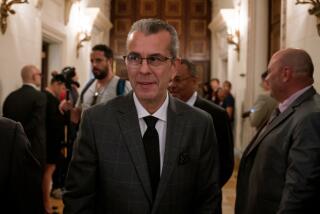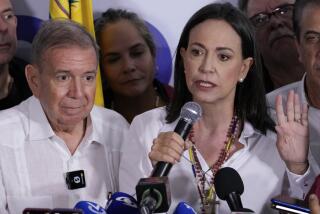Candidates warned to avoid early claims of victory in Afghanistan election
- Share via
KABUL, AFGHANISTAN — Election officials and Western diplomats Friday warned candidates against making premature claims of victory after aides to President Hamid Karzai said it appeared he had won Thursday’s vote.
Karzai’s chief rival, Abdullah Abdullah, meanwhile, declared that if the president had gotten more than 50% of the vote -- as required to avoid a runoff -- it would signal that Karzai’s supporters had committed massive fraud.
Many Western observers are concerned that the competing claims could set the stage for clashes between the candidates’ partisans and usher in a prolonged period of tension and instability while an official count is compiled.
A final tally is not scheduled to be disclosed until early September. A partial preliminary count was initially due today, but now is not expected until Tuesday.
Afghans defied Taliban threats and a rash of preelection violence, coming out by the millions to vote. But election officials acknowledged that turnout was lower than hoped, perhaps less than 50%.
When Karzai was voted into office in 2004, in Afghanistan’s first direct presidential election, the turnout was 70%.
The U.S. and its NATO allies are heavily invested in a credible outcome to this week’s vote. The election is a centerpiece of the Obama administration’s war strategy, based on the notion that the Afghan government must be viewed by its people as legitimate in order to make headway against a burgeoning insurgency.
The process is a slow one. Ballots have begun arriving in Kabul, the capital, from about 6,500 polling stations, reversing a sometimes-arduous journey before the election, when helicopters and donkeys had to be used to deliver election materials to some remote areas.
A spokesman for Afghanistan’s Independent Election Commission, Noor Mohammed Noor, said that candidates had no basis for declaring victory pending the official results. “Nobody should make such a claim,” he said.
A clouded aftermath to the vote raises the specter of ethnic strife, long a feature of the Afghan political landscape.
Karzai’s Pashtun ethnic group is the country’s largest, and his main base of support. But the Pashtun belt lies largely in the south and east, where violence and threats depressed the voter turnout.
Abdullah is politically identified with the Tajiks, who are the dominant group in the north. Conditions in that part of the country are more peaceful, and turnout voter there was higher as a result.
The Obama administration did not lend its support to any candidate, and special regional envoy Richard C. Holbrooke, who visited polling places on election day, said the U.S. would take “an agnostic position” on any claims of victory until the final results are in.
“We always knew it would be a disputed election,” said Holbrooke, who was briefed Friday by election observers. “I would not be surprised if you see candidates claiming victory and fraud in the next few days. For the United States, and the international community, we’re going to respect the process.”
Two other Western diplomats, speaking on condition of anonymity, said their governments had made their concerns known after Karzai’s campaign spokesman, Seddiq Seddiqi, was quoted as saying it appeared that the Afghan leader had garnered enough of the vote to obviate the need for a runoff.
A similar admonition against declaring victory was delivered to the Abdullah campaign, the diplomats said.
Foreign observer groups have lauded Afghans for braving danger in order to vote, and have expressed relief that the election passed without any large-scale insurgent attacks. But they have also described the balloting as flawed by the low turnout, especially among women, and by irregularities such as the sale of false registration cards.
The campaign season and the election coincided with some of the most intense fighting of the 8-year-old conflict between Western troops and the Taliban. Military officials Friday disclosed the deaths of three more Western troops: two British soldiers killed in the south and an American who died of wounds suffered a day earlier in eastern Afghanistan.
--
paul.richter@latimes.com
More to Read
Sign up for Essential California
The most important California stories and recommendations in your inbox every morning.
You may occasionally receive promotional content from the Los Angeles Times.











